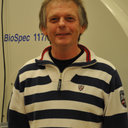A Fast Hydrogen Sulfide-Releasing Donor Increases the Tumor Response to Radiotherapy.
Nyckelord
Abstrakt
Hydrogen sulfide (H2S) is the last gaseous transmitter identified in mammals, and previous studies have reported disparate conclusions regarding the implication of H2S in cancer progression. In the present study, we hypothesized that sodium hydrosulfide (NaHS), a fast H2S-releasing donor, might interfere with the mitochondrial respiratory chain of tumor cells, increase tumor oxygenation, and potentiate the response to irradiation. Using electron paramagnetic resonance (EPR) oximetry, we found a rapid increase in tumor pO2 after NaHS administration (0.1 mmol/kg) in two human tumor models (breast MDA-MB-231 and cervix SiHa), an effect that was due to a decreased oxygen consumption and an increased tumor perfusion. Tumors irradiated 15 minutes after a single NaHS administration were more sensitive to irradiation compared with those that received irradiation alone (increase in growth delay by 50%). This radiosensitization was due to the oxygen effect, as the increased growth delay was abolished when temporarily clamped tumors were irradiated. In contrast, daily NaHS injection (0.1 mmol/kg/day for 14 days) did not provide any effect on tumor growth in vivo. To understand these paradoxical data, we analyzed the impact of external factors on the cellular response to NaHS. We found that extracellular pH had a dramatic effect on the cell response to NaHS, as the proliferation rate (measured in vitro by BrdU incorporation) was increased at pH = 7.4, but decreased at pH = 6.5. Overall, our study highlights the complex role of environmental components in the response of cancer cells to H2S and suggests a new approach for the use of H2S donors in combination with radiotherapy.


